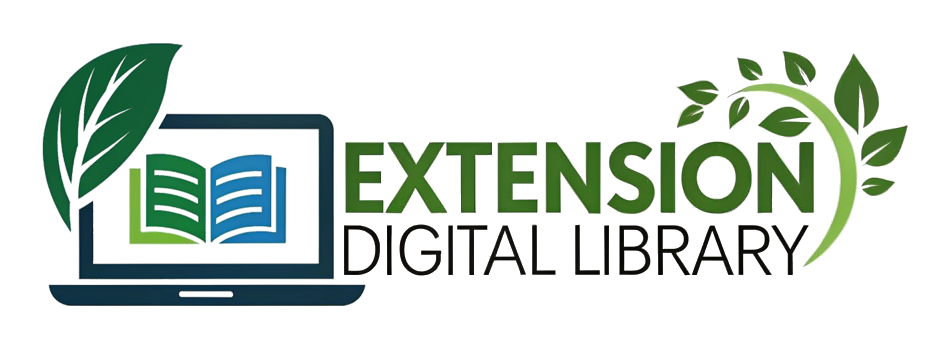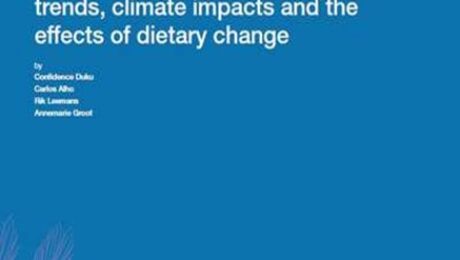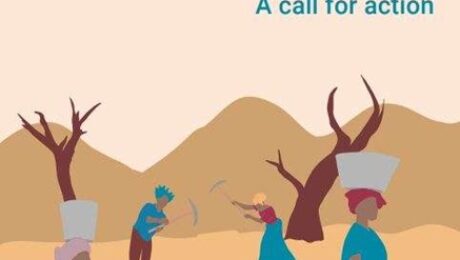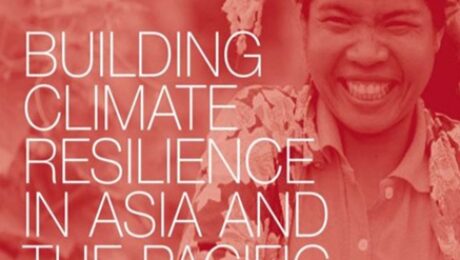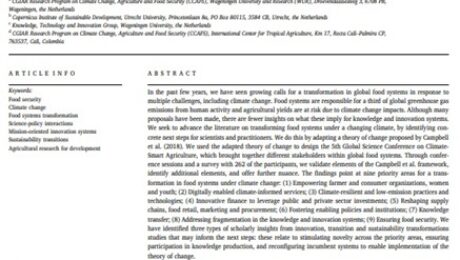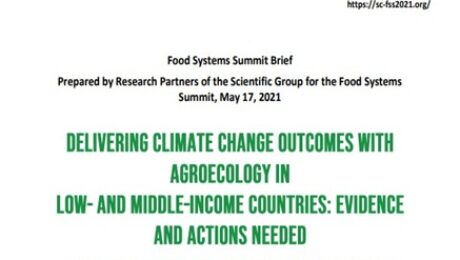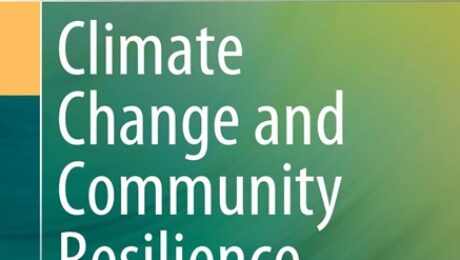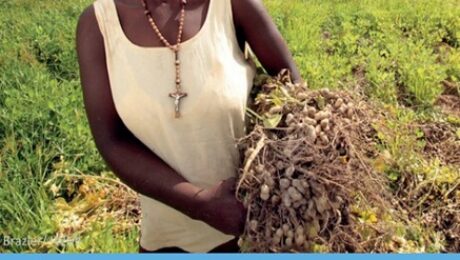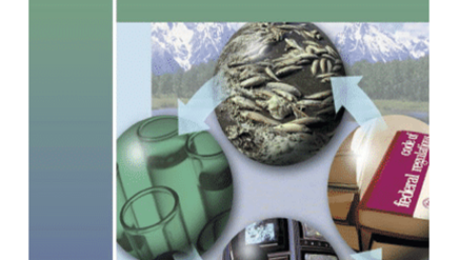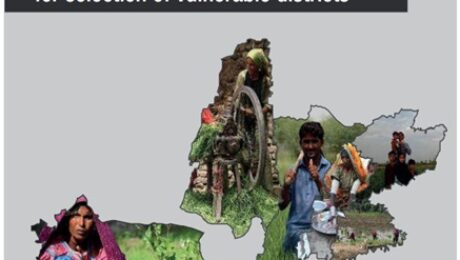Research Series 72: Climate change and food system activities – a review of emission trends, climate impacts and the effects of dietary change
This article reviews how food system activities contribute to climate change and how dietary changes affect food systems. It shows that while emissions from food production are increasing in most regions, emissions from land use change are decreasing. Despite these trends, land use emissions remain huge and are greater than emissions from food production in some regions.
While there is strong scientific consensus that climate change negatively affects food production, current scientific evidence is unclear about the impacts of climate change on post-production activities. This article also shows that dietary change has large potential to reduce greenhouse gas emissions. Despite its potential, the costs and feasibility of dietary change are not well understood and require further research.
Strategies to reduce emissions should focus on further reducing land use change as the current rate of reduction is inadequate to achieve a targeted reduction in greenhouse gas emissions. Strategies must also address meat consumption in regions where it consumption is excessive.
- Published in CLIMATE CHANGE
Women’s leadership and gender equality in climate action and disaster risk reduction in Africa
Despite the key roles that rural women play in food systems, in agrobiodiversity conservation, natural resource management, food production, preparation and marketing, rural women are particularly affected by the impacts of climate change due to limited access and control over resources fundamental to adaptation and limited participation in decision-making processes. Similarly, they lack equal access to productive resources needed for agricultural livelihoods, and are often the last to eat when food is scarce. Decision-making and leadership in climate action and governance are also male dominated and the decisions less likely to respond to women’s needs and wants.
It is therefore urgent to ensure that policy and programmatic response for building back better and strengthening the resilience of food systems and communities takes into account the interests and constraints of women and men from diverse social, cultural, ethnic and religious backgrounds. For this to happen, it is important to strengthen women’s leadership and participation at all levels of climate action and governance.
- Published in CLIMATE CHANGE
Building climate resilience in the Asia Pacific Region
IFAD’s ASAP projects in Asia and the Pacific region offer a host of valuable lessons that can be applied in the design and implementation of other climate change adaptation projects targeting smallholder farmers and rural communities around the world.
This study examines six projects, in three principal ecosystems of the region: a mountainous region, wetlands and a river delta. It derived four main recommendations for improving the design and effectiveness of adaptation projects both in the region and else where.
- Published in CLIMATE CHANGE
Enacting theories of change for food systems transformation under climate change
In the past few years, we have seen growing calls for a transformation in global food systems in response to multiple challenges, including climate change. Food systems are responsible for a third of global greenhouse gas emissions from human activity and agricultural yields are at risk due to climate change impacts. Although many proposals have been made, there are fewer insights on what these imply for knowledge and innovation systems. We seek to advance the literature on transforming food systems under a changing climate, by identifying concrete next steps for scientists and practitioners. We do this by adapting a theory of change proposed by Campbell et al. (2018). We used the adapted theory of change to design the 5th Global Science Conference on Climate-Smart Agriculture, which brought together different stakeholders within global food systems. Through conference sessions and a survey with 262 of the participants, we validate elements of the Campbell et al. framework, identify additional elements, and offer further nuance. The findings point at nine priority areas for a transformation in food systems under climate change
- Published in CLIMATE CHANGE
Delivering Climate Change Outcomes with Agroecology in Low-and-Middle-Income Country: Evidence and Actions Needed
Key Findings
Substantial evidence exists for the impacts of agroecology in low- and middle-income countries (LMICs) on climate change adaptation.
Knowledge gaps were found for agricultural climate change mitigation, resilience to extreme weather, and agroecology approaches involving livestock, landscape redesign and multi-scalar analysis.
Farm diversification had the strongest evidence for impacts on climate change adaptation.
The evidence for agroecology’s impact on mitigation in LMICs is modest and emphasises carbon sequestration in soil and biomass.
Agroforestry had the strongest body of evidence for impacts on mitigation.
Locally relevant solutions produced through participatory processes and co-creation of knowledge with farmers improved climate change adaptation and mitigation.
- Published in CLIMATE CHANGE
Climate Change and Community Resilience
This book was conceived and given life during the COVID-19 pandemic. We editors met every week, mostly on Mondays, online from March 2020 to September 2021 often testing the patience of our families as these meetings lasted several hours at night or early morning since we were working from different time zones. We are grateful to them for their support without which this book could not have taken shape. We are thankful to all the contributors who agreed to participate in this project—including the family, friends, colleagues, and mentees of Karl-Göran Mäler and SANDEE associates.
Once the contributors came on board with the revised manuscripts after receiving comments from the reviewers, we organised a four-day online writeshop bringing together all contributing authors from seven South Asian countries and beyond with more than ten different time zones. The writeshop turned into an excellent peer review platform for all the manuscripts included in the volume, where participants provided critical and open feedback that helped improve the quality of the chapters. We thank Oberlin College for the use of their Zoom platform for the writeshop and all meetings of the editors and contributors throughout the process. We are grateful to the South Asian Network for Development and Environmental Economics (SANDEE) at the International Centre for Integrated Mountain Development (ICIMOD) for making it possible to publish this volume as an open access resource. Aunohita Mojumdar helped us with language editing, and Neesha Pradhan provided logistical support.
- Published in CLIMATE CHANGE
Food-system interventions with climate change and nutrition co-benefits: a literature review
This literature review report explores the conceptual linkages between climate change and nutrition using a food system approach.
The report also reflects on the current body of information derived from projects promoting climate change mitigation and adaptation, with nutrition co-benefits and vice versa. The recommendations in this report can inform future design and implementation of projects that seek to achieve both climate change mitigation and adaptation objectives as well as improved nutrition.
- Published in CLIMATE CHANGE, NUTRITION
A Changing Climate for Knowledge Generation in Agriculture: Lessons to Institutionalize Science-Policy Engagement
Effective science-policy engagement efforts are crucial to accelerate climate action. Such efforts should be underpinned by high-quality knowledge generation that enhances salience, credibility and legitimacy of research results. This is particularly important for the agricultural sector. Agriculture has been identified as a priority for climate action. The sector also constitutes well-established institutions set up to help achieve food and nutrition security. Institutionalizing high quality knowledge generation for climate change adaptation within these institutions presents a major opportunity to catalyze climate action within the sector. To contribute to insights about this institutionalization, we draw on and develop Cash et al.’s 2002 success conditions for enhancing salience, credibility and legitimacy: (1) increased accountability, (2) use of boundary objects, (3) participation across the boundary, (4) mediation and a selectively permeable boundary, (5) translation, and (6) coordination and complementary expertise. We examine how these success conditions apply in a major global case of agricultural research for development under climate change: the CGIAR Research Program on Climate Change, Agriculture and Food Security (CCAFS). We explore these success conditions in the wider context of CGIAR reform and response to climate change as the international system for Agricultural Research for Development (AR4D). Our results specify and confirm the practical relevance of the six success conditions for institutional design and reform, but also point to the need to complement these with two inductively-derived success conditions: effective leadership and presence of incentives. To institutionalize these success conditions among AR4D institutions, there is an urgent need to create a conducive environment that enables the development of context-specific science-policy engagement strategies, along with leadership development and efforts to break traditional disciplinary silos which constrain user-oriented knowledge production.
- Published in CLIMATE CHANGE
Climate change vulnerability and adaptation strategies for smallholder farmers in Yangi Qala District, Takhar, Afghanistan
Modelling of climate change scenarios for Pakistan indicates that if agriculture and water management in the Indus River Basin continue in a ‘business as usual’ mode, the increase in temperatures and changes in precipitation will pose serious threats to the future livelihoods of farmers and to the Pakistani agricultural sector. In this context, FAO Pakistan has proposed a project to the Green Climate Fund (GCF) on “Transforming the Indus Basin with Climate Resilient Agriculture and Water Management”. This project is designed to change that by moving away from ‘business as usual’ in the Basin and shifting agriculture and water management to a new paradigm in which producers are successfully adapting to climate change and are able to sustain their livelihoods. The project objective is to transform agriculture in the Basin by increasing resilience among the most vulnerable farmers and strengthening the Government’s capacity to support their communities to adapt. To ensure the success of the project, an appropriate selection of districts for project interventions is a crucial factor. The Technical team at FAO has employed a detailed Multiple Criteria Decision Analysis (MCDA) technique using GIS for the selection of the district areas. As an outcome of the detailed MCDA analysis, a GIS based vulnerability index has been developed for the districts. Based on the vulnerability index, eight districts in Punjab and Sindh are selected for the implementation of the project.
- Published in AFGHANISTAN, CLIMATE CHANGE
Multi-criteria decision analysis for selection of vulnerable districts
Modelling of climate change scenarios for Pakistan indicates that if agriculture and water management in the Indus River Basin continue in a ‘business as usual’ mode, the increase in temperatures and changes in precipitation will pose serious threats to the future livelihoods of farmers and to the Pakistani agricultural sector. In this context, FAO Pakistan has proposed a project to the Green Climate Fund (GCF) on “Transforming the Indus Basin with Climate Resilient Agriculture and Water Management”. This project is designed to change that by moving away from ‘business as usual’ in the Basin and shifting agriculture and water management to a new paradigm in which producers are successfully adapting to climate change and are able to sustain their livelihoods. The project objective is to transform agriculture in the Basin by increasing resilience among the most vulnerable farmers and strengthening the Government’s capacity to support their communities to adapt. To ensure the success of the project, an appropriate selection of districts for project interventions is a crucial factor. The Technical team at FAO has employed a detailed Multiple Criteria Decision Analysis (MCDA) technique using GIS for the selection of the district areas. As an outcome of the detailed MCDA analysis, a GIS based vulnerability index has been developed for the districts. Based on the vulnerability index, eight districts in Punjab and Sindh are selected for the implementation of the project.
- Published in CLIMATE CHANGE, NATURAL RESOURCE MANAGEMENT, PAKISTAN
